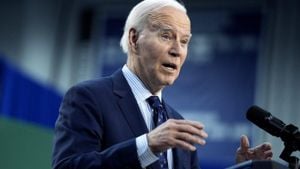Universities across the United States are wrestling with their admission policies, as pressures mount to create more diverse campus environments. This dialogue has intensified recently, reflecting broader societal trends and civil rights discussions, as institutions grapple with balancing academic merit with the need for inclusivity.
Many universities are reexamining traditional admission metrics, like standardized test scores and GPAS, acknowledging they can disadvantage minorities and lower-income students. Take the University of California system, which abolished the SAT and ACT requirements, arguing these tests do not accurately measure student potential. Instead, the emphasis on holistic reviews aims to give underrepresented groups—who often face systemic barriers—a fairer shot at higher education.
The aims of these changes resonate beyond just increasing enrollment numbers. The intention is to enrich the academic environment by bringing different perspectives to campus. But, the shift has not come without backlash. Critics argue eliminating standardized tests can lead to lower academic standards. This debate isn’t new but has gained new urgency as the nation continues to navigate issues surrounding equity and access.
For some institutions, addressing diversity means more than just changing admission criteria; it's part of broader initiatives to create inclusive campuses. This includes programs to support students once they arrive on campus, tackling challenges like food insecurity and mental health resources. All of this is linked to realizing the potential of every student.
One significant example is found at Harvard University, where litigation around its admissions practices has highlighted how race can play a role. A recent lawsuit has challenged the university over claims it discriminates against Asian American applicants, raising tough questions about how far equity initiatives should go. This issue exemplifies the delicate balancing act universities must maintain between fostering diversity and adhering to legal frameworks.
Another key aspect of the discussion is how to define success concerning these initiatives. Is it merely numbers? Is it about creating spaces for dialogues and comprehensive support systems? Institutions are increasingly recognizing success can't just be measured by how many underrepresented students they enroll but also by how they support and retain these students throughout their academic journeys.
The economic barriers to higher education are also part of the equation. Many initiatives aim to tackle these disparities; some universities have implemented tuition-free programs or increased financial aid for low-income families. Keeping costs manageable allows more students from diverse backgrounds to take part.
To complement financial aid, many institutions have also ramped up mentorship programs, connecting incoming students with alumni and upperclassmen who can guide them through the challenges of college life. Building community is key, as it can make or break whether students stay on campus and succeed.
State and federal policymakers have had their hands full with this dialogue, too. Recent legislation aimed at bolstering support for underprivileged students, alongside efforts to protect affirmative action policies, has sparked heated discussions across the political spectrum.
At its core, this debate is about recognizing the value of diversity and the unique insights it brings to the table. Higher education faculty recognize the interplay of different backgrounds is not merely beneficial for social equity but is also foundational to the learning experience. Engaging with diverse perspectives prepares students for real-world challenges.
Data shows students benefit from diverse learning environments. Research conducted by The American Council on Education indicates diverse groups lead to enhanced creativity and problem-solving capabilities. When students learn with peers who have different experiences and viewpoints, they tend to enrich their educational journeys, cultivating skills they will need to navigate the increasingly complex world.
Yet, with all these changes, universities face questions of transparency. How do institutions plan to report on their diversity initiatives? Will there be accountability measures to assess how effective these programs have been? Stakeholders, from students to government officials, seek clarity as the future of admissions practices evolves.
Universities are under the spotlight to present more detailed data on the outcomes of their diverse admissions initiatives, evaluating not just how many diverse students are admitted but also how they perform and complete their degrees. These measures are necessary to validate the effectiveness of admissions policies, fostering trust within and outside the campus.
Moving forward, institutions are more mindful than ever about their roles. Crafting equitable admission policies isn't just about compliance; it's about making meaningful changes. The conversations around these changes underline the broader societal shifts, as educational institutions strive to mirror the diversity and complexity of the communities they serve.
To sum it up, universities are at a pivotal moment where they can redefine access to higher education, aligning policies with modern needs. Challenging existing frameworks could result in innovative solutions, ensuring the educational system doesn't just open doors but also lays the foundation for future generations.



